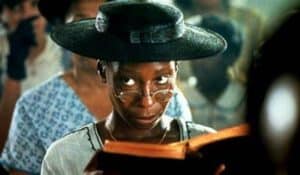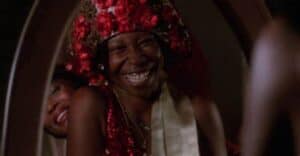The Color Purple Celie is only one of the amazing and inspiring characters from Alice Walker’s Pulitzer Prize-winning novel. Celie is a southern girl who has been abused her entire life but gradually gains strength from the other ladies in her life. This story of how she does so is nothing less than extraordinary.

The Color Purple Synopsis:
In Georgia in the winter of 1909, Celie is raped at the age of 14 by a guy she refers to as “Pa.” She had two children with him throughout the years, both of whom were snatched away at delivery. Her younger sister, Nettie, is the only person she can talk to now as her mother is deceased. Celie’s (Whoopi Goldberg) intimate connection is shattered when she is forced to marry Albert (Danny Glover), a widower with four small children.
Celie communicates with God and lives day by day, alone, friendless, and afraid of this man she refers to as “Mister.” When Nettie (Akosua Busia) arrives seeking safety from “Pa,” it is the one bright spot in her life. She helps her elder sister read, but she evokes Albert’s libido in the process. He kicks Nettie off the farm when she declines his approach. Nettie swears she will write and that only death will be able to keep them apart. Celie falls into darkness when no letter is received by her sister.

Celie’s life is turned upside down when two friends appear at the most inappropriate time. Sofia (Oprah Winfrey) marries Harpo (Willard E. Pugh). She’s a raucous woman who appears to have a stranglehold on her timid spouse. Celie has a great deal of admiration for this woman who has spent her entire life fighting for her freedom. When Celie becomes unwell, Albert takes Shug Avery (Margaret Avery) to the house, which is even more startling. Celie is instantly smitten by this vibrant blues singer, who has been his mistress for years. Shug sings “Miss Celie’s Blues” to her new buddy at a neighboring juke joint, encouraging her to “believe you’re somebody.” Later that evening, Celie is introduced to the joys of the body by the singer, an experience she has never had in her bad marriage.
As the year progresses, Celie longs for a letter from her sister. Shug, who is now married, comes across a note from Nettie one day. She’s assisting the couple who fostered Celie’s two children in Africa. Celie and Shug investigate the home for further letters from Nettie, which they discover stashed behind the bedroom floorboard. Celie discovers Albert has been withholding the letters for years, leading her to believe her beloved sister has died. All of her bottled wraths explode during a dinner party in a diatribe against the guy who has mistreated her physically, mentally, and spiritually. She abandons Albert and inherits a family farm from her true father. She opens a clothes boutique and is surrounded by her female friends’ wit and courage.
The Color Purple Celie’s Character:
Alone and scared
Celie’s only option is to tell God her secrets because she has no one else to confide in. Her mother is no longer alive, and her stepfather, whom she believes is her biological father, is aggressive and has two illegitimate kids with her. Her children are taken away, and she believes Pa is responsible for the death of at least one of them. She has no one to turn to except her sister, who has been unable to help her due to her violent husband’s lust. Celie is consumed with shame and committed to keeping this secret hidden from everyone but God.
Devoted to getting freedom:
Celie is portrayed by Walker as a woman who succeeds in rescuing herself from the dominance of abusive males, both physically and emotionally. Celie is completely dominated by two abusive guys, Fonso and Mr_, at the outset of the film. Her fellow ladies support her, and she ultimately succeeds after a lot of determination. Celie is self-sufficient, confident, and independent at the end of the story, having realized that she does not have to be a servant to men or comply with traditional views about how a woman should act.

Interesting facts about The Color Purple Celie:
- The novel’s central theme is, unsurprisingly, female friendship and mutual support as Celie’s life is dominated by two female relationships.
- Celie’s love affair with her husband’s mistress, Shug Avery, plays an important role in her personality, particularly in terms of her sexuality.
- A dynamic character is one who develops during the course of a plot as a result of the problems they face along the way.
- She writes to God since she has no one else to turn to for support in dealing with this horrible news. Celie’s ordeal is so traumatic that she can only tell someone who she believes loves her about it. but She comes to the conclusion that she can’t believe in a God that is portrayed as a white patriarch, symbolizing the dominant white racist civilization that has subjugated black people for ages.

